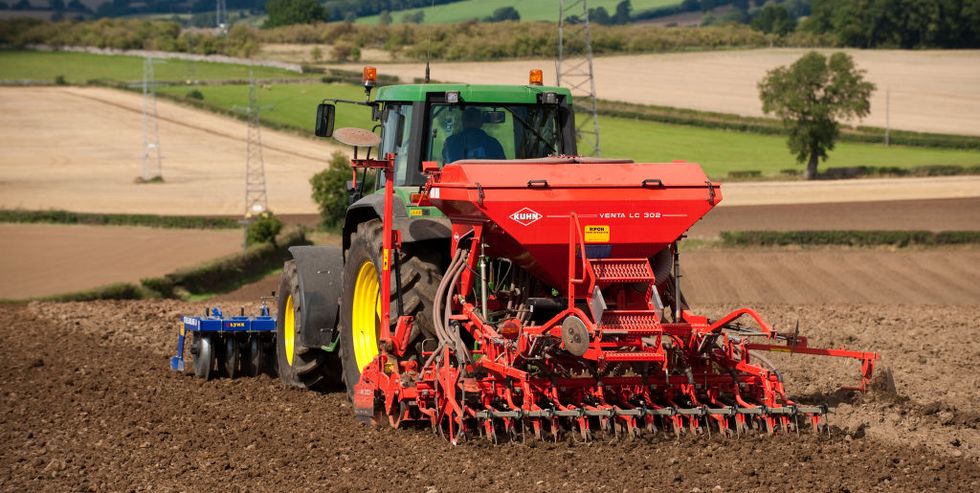Post by torpedo on Jan 12, 2020 0:15:34 GMT
Why Farmers Still Insist on Buying Really Old Tractors


By Caroline Delbert
Farmers are creating more and more demand for high-quality used tractors.
John Deere is eyeing technology like autonomous drones, but small farmers' real income just can't support these purchases.
As long as farmers can find simpler machines that are easy to maintain and repair, they'll keep buying used tractors.
Minnesota’s Star Tribune reports that farmers are flocking to 40-year-old tractors at auctions. The appeal is twofold: While classic tractors are cheaper to maintain, simpler to use, and much simpler to repair, they’re still also far cheaper than comparable new tractors. Farmers are letting their money talk as they turn away from costly and cushy new models and choose older ones instead.
Advertisement - Continue Reading Below
The Star Tribune mentions a recent record-setting auction where a 1979 John Deere 4640 tractor sold for $61,000. With just 826 hours on the clock—tractors log hours, not miles—out of an expected lifetime of up to about 15,000, this is the tractor version of a car someone “only drove to church on Sunday.” (Let’s all, for no particular reason, revisit “Little Old Lady from Pasadena.”) Still, $61,000 sounds like a lot, until you see a comparable horsepower, used, low-hours 2019 John Deere row crop tractor is listed for $141,000.
The average farm business, a category defined as farms with gross income over $350,000 or some smaller farms that meet certain criteria, makes an average of just over $90,000 in profits per year. That 2019 number is up almost 20 percent from 2018. For farmers to accumulate even the record-setting $61,000 tractor is a huge undertaking, but a used, newer tractor for the price of a well-equipped Maserati Quattroporte might as well be a Maserati for how feasible it is for an average farmer.
John Deere is eyeing technology like autonomous drones, but small farmers' real income just can't support these purchases.
As long as farmers can find simpler machines that are easy to maintain and repair, they'll keep buying used tractors.
Minnesota’s Star Tribune reports that farmers are flocking to 40-year-old tractors at auctions. The appeal is twofold: While classic tractors are cheaper to maintain, simpler to use, and much simpler to repair, they’re still also far cheaper than comparable new tractors. Farmers are letting their money talk as they turn away from costly and cushy new models and choose older ones instead.
Advertisement - Continue Reading Below
The Star Tribune mentions a recent record-setting auction where a 1979 John Deere 4640 tractor sold for $61,000. With just 826 hours on the clock—tractors log hours, not miles—out of an expected lifetime of up to about 15,000, this is the tractor version of a car someone “only drove to church on Sunday.” (Let’s all, for no particular reason, revisit “Little Old Lady from Pasadena.”) Still, $61,000 sounds like a lot, until you see a comparable horsepower, used, low-hours 2019 John Deere row crop tractor is listed for $141,000.
The average farm business, a category defined as farms with gross income over $350,000 or some smaller farms that meet certain criteria, makes an average of just over $90,000 in profits per year. That 2019 number is up almost 20 percent from 2018. For farmers to accumulate even the record-setting $61,000 tractor is a huge undertaking, but a used, newer tractor for the price of a well-equipped Maserati Quattroporte might as well be a Maserati for how feasible it is for an average farmer.
John Deere is just keeping up with the times in terms of advancing technology and comforts—its landing page for utility tractors says, “With options like hydraulic cab suspension, panorama roofs and up to 30 degrees of right-hand seat swivel, the only thing on your mind will be the task at hand”—but with every new technology, especially the ones powered by onboard computers, comes a new complex thing that can break, causing costly downtime when a simpler tractor could still be running.
If a more mechanical and less electronic tractor does break down, a farmer is more likely to be able to repair it themselves or call a local shop without having to send out for a replacement computer or an expensive diagnostic.
Farmers do embrace plenty of technology, and there’s no part of this that’s motivated by a fear of technology. Planters have replaced one of the most backbreaking and tedious tasks in farming and continued to get better and better over time, but farmers are still looking for used versions of these, which can cost $300,000 or more. The idea of much faster, more efficient work is appealing to everyone, but the extremely high cost in cash and lost time of both purchase and repairs to these complex machines makes them just out of reach for anyone not part of the big corporate farm economy.
If a more mechanical and less electronic tractor does break down, a farmer is more likely to be able to repair it themselves or call a local shop without having to send out for a replacement computer or an expensive diagnostic.
Farmers do embrace plenty of technology, and there’s no part of this that’s motivated by a fear of technology. Planters have replaced one of the most backbreaking and tedious tasks in farming and continued to get better and better over time, but farmers are still looking for used versions of these, which can cost $300,000 or more. The idea of much faster, more efficient work is appealing to everyone, but the extremely high cost in cash and lost time of both purchase and repairs to these complex machines makes them just out of reach for anyone not part of the big corporate farm economy.











